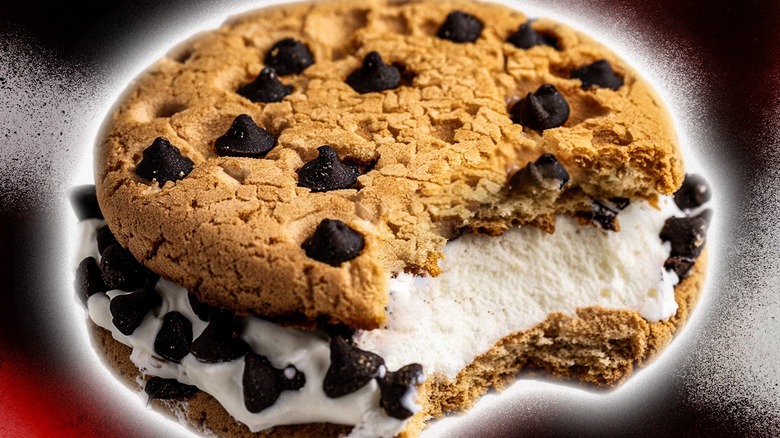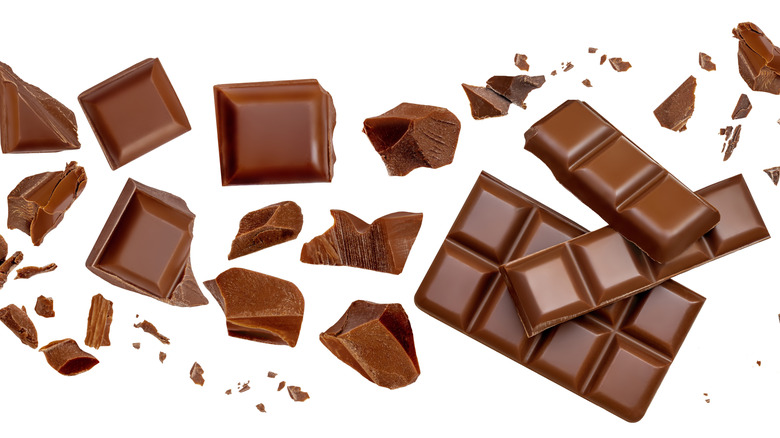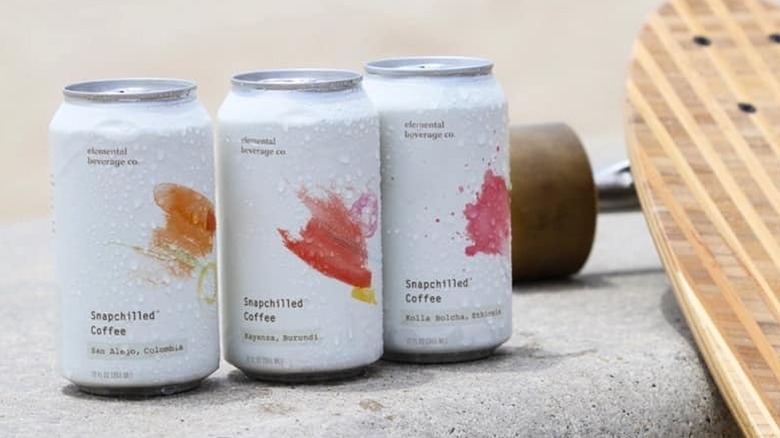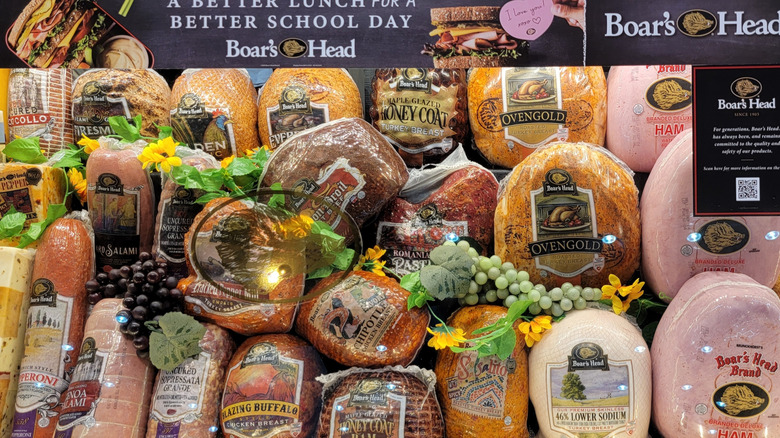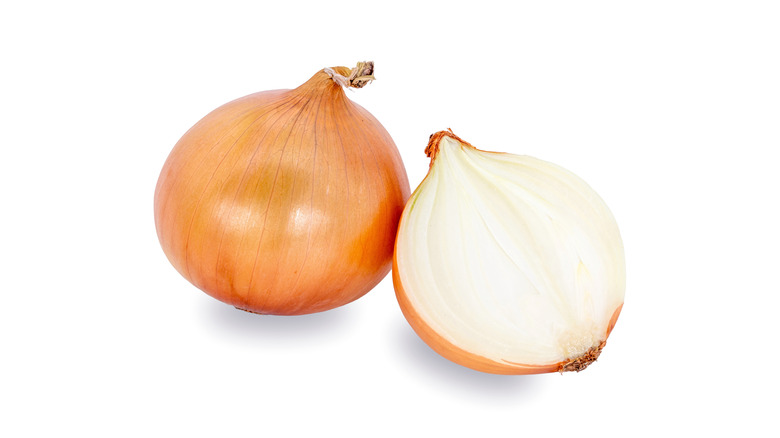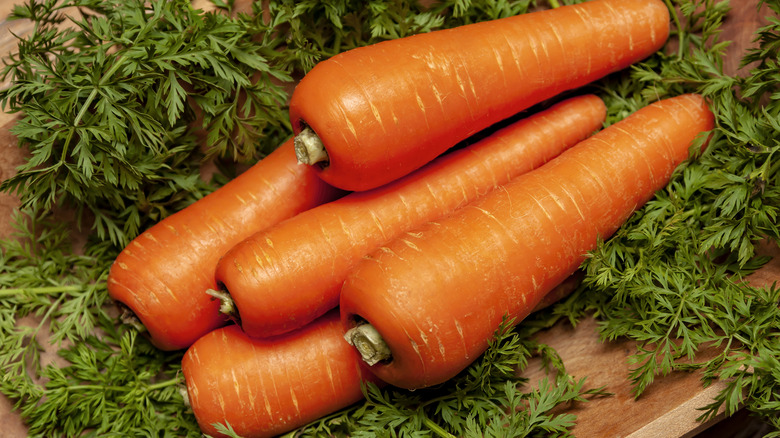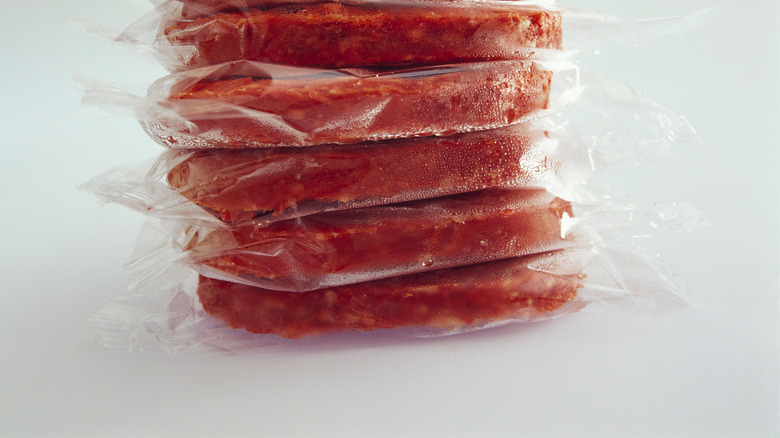The Biggest Food Recalls That Plagued 2024
Major food recalls seemed to garner coverage from mainstream news outlets with increasing regularity throughout 2024. Whereas oftentimes maybe just a couple of food recalls will make national news in a given year, a good handful of big-name companies recalled massive amounts of potentially dangerous products in the second half of 2024 alone. Many of these cases followed legitimate outbreaks of dangerous illnesses. The frequency of these recalls was so atypical, outlets from the New York Times to CBS News published analyses of the apparent trend.
According to both pieces, food in the United States isn't inherently becoming more dangerous. Rather, while the increasing complexity of the supply chain may increase potential for risk, food testing technology is also improving and halting the progress of foodborne illnesses earlier than was possible in the past. Whether the year was deadlier than usual or not, it's hardly controversial to acknowledge that huge quantities of food were recalled throughout 2024 — and, while factors like undeclared allergens or faulty packaging are typically common culprits, all of the following recalls were due to bacteria risk. With that said, these are the biggest food recalls of 2024 based on the quantity of affected product and/or overall dangerousness, each responsible for awareness of food safety increasing significantly in the national consciousness over the course of the year.
February 2024: Cheese and dairy products recalled for listeria
The first major food recall of 2024 occurred in February, when a company called Rizo-López Foods recalled a range of dairy products after they were linked to a listeria outbreak. Rizo-López produces and supplies dairy products under a variety of brand names, including Tio Francisco, Rizo Bros, Food City, and Whole Foods' proprietary 365 brand, among others. The 50-plus items encompassed by the recall included cheeses, sour creams, and yogurts. Major grocery stores including Trader Joe's and iconic budget-oriented warehouse chain Costco likewise had to recall premade meal kits and a salad dressing that incorporated cheeses named in the initial recall.
In total, the listeria outbreak to which these products were linked consisted of 26 reported cases, including 23 hospitalizations and 2 deaths, spanning 11 states. The CDC determined a link between the outbreak and Rizo-López after identifying the strain of listeria bacteria responsible in one of the company's cheese products. Months later, in October, a California court issued a formal decree prohibiting Rizo-López from continuing business operations until rectifying what was ruled to be noncompliance with certain FDA regulations. Between its deadliness, scale, and legal ramifications, then, the February Rizo-López recall earns a spot among the biggest food recalls of 2024.
May 2024: Chocolates recalled for salmonella
In a year that eventually became notorious for food safety scares, the first few months of 2024 were surprisingly light in major food recalls. Furthermore, one of first big food recalls following that quiet stretch didn't appear to endanger any lives, but was notable, rather, for the sheer volume of product impacted.
Specifically, in May, a chocolate supplier called Clasen Quality Chocolate recalled 10 of its chocolate products, many of which were sold in bulk, over the possibility they were contaminated with salmonella. The recall spanned nine states but was never publicly linked to any active salmonella infections. The FDA even categorized this as a Class II recall on a three-tiered scale. Recalls over salmonella risk can earn Class I classification, so the FDA decided that this instance posed less of a threat to public health than some of the most dangerous salmonella scares. Nevertheless, according to a figure published by the Food Industry Counsel, Clasen Quality Chocolate recalled over 4.3 million pounds of chocolate in total. It is such sheer quantity — higher than what's recalled in the vast majority of cases with reported volume — that qualifies the May 2024 Clasen Quality Chocolate recall for a spot on this list.
May 2024: Various wholesale products recalled for salmonella
On May 3, 2024 — the same date the FDA announced the Clasen Quality Chocolate recall — Danisco USA recalled a wide range of food products over the possibility they might be infected with salmonella. While far from a household name, Danisco USA is the domestic food product subsidiary of a massive corporation called International Flavors & Fragrances Inc. Around the world, IFF owns companies under the Danisco nomenclature including in countries like China, India, Canada, France, Egypt, South Africa, and many more. It should hardly come as a surprise, then, that Danisco is one of the world's biggest ingredient suppliers according to reporting by Consumer Affairs.
Danisco USA's May recall encompassed over 1.2 million pounds of 36 different products, per the Food Industry Counsel, including whipped cream, coffee creamer, and yogurt, among others. Products with the potential to carry salmonella were distributed to 24 states in total, spanning all regions of the United States. A representative for IFF told Consumer Affairs that Danisco USA was not necessarily at fault, but rather, one of its suppliers had reported possible salmonella contamination. In fact, an in-house test at Danisco USA returned negative for salmonella, but the company issued its expansive recall all the same. While the FDA categorized this as a Class I recall, no salmonella cases were ever linked to Danisco USA products. Nevertheless, this recall is noteworthy for affecting 36 distinct wholesale products across a sizable expanse of the U.S.
June 2024: Canned coffee recalled for botulism
Salmonella, listeria, and E. coli are some of the most common culprits behind illness-related food recalls. In June, however, risk of a rarer illness necessitated one of the biggest food recalls of 2024. Specifically, a company called Snapchill recalled just under 300 canned coffee products — made for over 100 coffee brands including names like Cape Cod Coffee and Intelligentsia — after determining their production method might cause a risk that they could harbor Clostridium botulinum bacteria, responsible for botulism.
Snapchill's proprietary product is not actually coffee but a technology that produces canned cold coffee from coffee brewed hot, with the intent of ensuring its best possible flavor when served chilled. According to reporting by CBS News, no botulism cases resulted from any of Snapchill's recalled products, and the company never actually identified the responsible bacteria at its production facility. Rather, it was a notice from the FDA informing the company it had not officially filed its manufacturing technology with the agency that necessitated taking action. Back in 2002, botulism risk was likewise responsible for one of the biggest recalls in General Mills history. Since the illness can be fatal, decisive action like Snapchill's expansive recall is well warranted.
June 2024: Ice cream recalled for listeria
In June of 2024, ice cream manufacturer Totally Cool instituted a gargantuan recall of ice cream products it produced for a range of nationally well-known brands over listeria risk. In total, the Food Industry Counsel reported that the volume of recalled product added up to 64.4 million pounds, qualifying as the largest food recall of the year by quantity and then some.
Among more than 60 distinct products that Totally Cool recalled were Chipwich's signature ice cream sandwiches – an ice cream treat that once had Costco shoppers raving – a Friendly's ice cream cake, Hershey's Cookies & Cream Ice Cream Cones, and Jeni's ice cream sandwiches. No salmonella infections ever surfaced that were linked to the recalled ice cream, so in that sense, Totally Cool's decisive action paid off. However, just about two months later, Totally Cool filed for Chapter 11 bankruptcy as a direct result of the recall's impact on business. At that time, the company decided to lay off 68 of its 71 overall employees. Totally Cool didn't quite close down for business, but operations were pared back from what used to be prolific ice cream treat production to its remaining three employees simply attempting to sell the company.
July 2024: Boar's Head meats recalled for listeria
The first of numerous — and perhaps the most notorious of all — recalls to truly attract widespread, national attention in 2024 was when Boar's Head recalled millions of pounds of deli meats for their link to a deadly listeria outbreak in July. Unsurprisingly, this constituted one of the biggest meat recalls in U.S. history.
In short, an initial July 26 recall of 207,528 pounds of deli meats expanded to 7.2 million pounds on July 30, all following a Boar's Head liverwurst product testing positive for a strain of listeria responsible for an active outbreak. That second, larger number encompassed all meats produced at the plant behind the infected liverwurst.
By the time the CDC declared that the outbreak had concluded in late November, 61 people in 19 states had reported listeria infections linked to Boar's Head meats, including 60 hospitalizations and 10 deaths. That said, the recall's impact was still developing significantly even then, between active USDA investigations into both the company's conduct during the recall and general manufacturing conditions. Multiple lawsuits were likewise still in the works. Based on its deadliness alone, the Boar's Head recall of July 2024 isn't just one of the biggest food recalls of the year but has already earned a spot among some of the deadliest cases of foodborne illness in United States history.
September 2024: Eggs recalled for salmonella
While considerably smaller than the Boar's Head outbreak in scope, active foodborne infections necessitated another noteworthy food recall just months later. It was the FDA that tested eggs from a business called Milo's Poultry Farms and found them to be positive for salmonella in September. By that point, an active salmonella outbreak was already underway, hence the FDA's determination as opposed to the farm identifying the risk through its own tests.
Initially, all eggs sold under the Milo's Poultry Farms and Tony's Fresh Market labels were subject to the recall, albeit spanning just the states of Wisconsin, Illinois, and Michigan. That first round consisted of 108,00 egg cartons. Then, an expanded recall increased that number to over 345,000 cartons, likewise including duck eggs under the Happy Quackers Farm label and free range M&E Family Farms chicken eggs. The salmonella outbreak linked to Milo's Poultry Farms was confirmed to have affected 93 people in 12 states, 34 of whom were hospitalized. The majority of cases were identified in the farm's home state of Wisconsin.
October 2024: Onions recalled for E. coli
In October of 2024, some McDonald's customers began falling ill after contracting E. coli from Quarter Pounder burgers. By the following month, the outbreak ballooned to 104 cases across 14 states, including 34 hospitalizations and one death. Unsurprisingly, the E. coli outbreak affected business at McDonald's, causing a significant downturn. That said, McDonald's never really had to recall its Quarter Pounders, per se — they simply removed them from the menu for a time, before bringing them back without onions.
Specifically, it was onions supplied to McDonald's by vegetable provider Taylor Farms that were found to carry the bacteria. Accordingly, they were subject to a major recall. For what it's worth, it wasn't just McDonald's but chains like Taco Bell, Burger King, and KFC that likewise removed onions from their fast food items in response to the E. coli outbreak. Everyone who fell ill that the CDC interviewed, however, recounted eating a McDonald's Quarter Pounder beforehand. No illnesses were linked to Taylor Farms onions at any other fast food chain. While the quantity of onions recalled is unclear, the illness' expansion and its effect on one of the most iconic American businesses easily qualify the Taylor Farms onion recall as one of 2024's biggest.
October 2024: Chicken and turkey recalled for listeria
Simply put, October of 2024 was a busy month for food recalls. The second of three to make it on this list encompassed precooked chicken and turkey products provided to retailers by a company called BrucePac. Initiating the recall was a routine inspection of the company's premade chicken by the USDA's Food Safety and Inspection Service that returned positive for listeria.
BrucePac provided poultry to a number of popular grocery stores nationwide and well over 200 schools as well. Stores required to recall products containing said chicken or turkey included Sprouts, Costco, Aldi, Target, Walmart, Trader Joe's, and Kroger, among others. Impacted items weren't just packaged under store brands, but products produced by third parties that could theoretically be found in any grocery store, national or local. Those included brands like EVOL, Dole, Taylor Farms, Red's, and many others. Ultimately, no reported illnesses ever arose from the bacteria identified in this case. That said, the total quantity of poultry encompassed by the recall added up to more than 11 million pounds, eclipsing the vast majority of food recalls in size all the same.
October 2024: Frozen waffles recalled for listeria
Also in October of 2024, a foods manufacturer called TreeHouse Foods recalled a huge number of waffle products after routine testing determined that they might carry listeria bacteria. TreeHouse Foods waffles are packaged and sold under a pretty wide variety of labels, and the scope of the company's initial recall included brands like Best Choice, Clover Valley, Food Lion, Giant Eagle, Great Value, Kodiak Cakes, Publix, and more. Overall, that first recall included more than 600 products alone.
Less than a week later, TreeHouse Foods expanded its recall to include a new batch of products, encompassing all of the output from the facility responsible for the waffles that returned that initial positive test. This included plenty more waffles in addition to some pancake products. Brands new to this second wave included 365 Organic, Brookshire's, Nature's Path Organic, O Organics, and Signature Select, among others. Affected items were distributed both nationwide and in parts of Canada. These hundreds upon hundreds of prepackaged waffles seem to have been recalled in time, because no illnesses were ever reported that could be traced back to bacteria from TreeHouse Foods' facility.
November 2024: Organic carrots recalled for E. coli
E. coli struck again just a month or so after the McDonald's incident. In November of 2024, a number of individuals fell ill after contracting E. coli bacteria traced back to organic carrots from a business called Grimmway Farms. As is often the case in vegetable recalls, Grimmway Farms didn't package carrots under its own label but supplied plenty of popular brands throughout the United States including Puerto Rico, as well as in Canada. Recalled products included both whole and baby carrots sold under brand names like 365 Organic, Good & Gather, Nature's Promise, O Organics, Simple Truth, Trader Joe's, and Wegmans, among others.
Subsequently, both Whole Foods and falafel brand Fabalish Inc. instituted separate recalls of products they presumably assembled in-house, all utilizing Grimmway Farms organic carrots. The initial recall likewise expanded days later, though the list of added products was considerably smaller than what was included in the first round. In full, 39 illnesses in 18 states could be traced back to Grimmway Farms carrots, including 15 hospitalizations and one death.
November 2024: Ground beef recalled for E. coli
The November 2024 Grimmway Farms organic carrot recall turned out to be just one of two major food recalls necessitated by an active E. coli outbreak in a single month. While the subsequent outbreak was contained entirely in Minnesota, 19 people fell ill due to E. coli bacteria that originated from the same meatpacking company. Of those 19 individuals, four required hospitalization and two ended up with serious health complications.
Initially, after identifying 15 E. coli patients who developed their illnesses in Minnesota between November 2 and November 10, the USDA's Food Safety and Inspection Service determined that ground beef from a Detroit-based company called Wolverine Packing Co. was responsible once a sample came back positive for the bacteria. Wolverine Packing Co. ships meat across the United States, and ultimately recalled 167,000 pounds of various ground beef products. Fortunately, no illnesses outside of Minnesota ever publicly materialized despite the potentially tainted ground beef's national reach, suggesting that the recall successfully mitigated any further damage.
